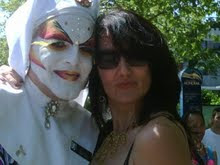Charting a decade of progress in gay rights
Wednesday, December 16, 2009
While gay rights advocates remember 2009 for its political setbacks and frustrations, the movement has made remarkable progress in civil rights in the past decade, according to a report released today.
More states have anti-discrimination laws, more top corporations protect workers based on sexual orientation, and gay youth are finding more support in school, according to findings from a study by the Evelyn and Walter Haas Jr. Fund and the Movement Advancement Project, a think tank specializing in lesbian, gay, bisexual and transgender issues.
In the latest step for gay rights, the Washington, D.C., City Council voted Tuesday to legalize same-sex marriage, making it the first jurisdiction south of the Mason-Dixon Line to do so. Because Washington is a federal district, Congress has 30 working days to veto the law.
Same-sex marriage is legal in Iowa, Vermont, Massachusetts and Connecticut and will be legal in New Hampshire on Jan. 1.
"When they're working in the day-to-day trenches, sometimes people don't see the progress that has been made," said Matt Foreman, who directs the gay and immigrant rights program at the Haas foundation. The organization, which has poured $42 million into LGBT causes in the past decade, commissioned the report to chart progress over that time.
"An increasing number of people (44 percent of Americans) are living in a state that provides nondiscrimination protections to people," Foreman said. Ten years ago, the study found that only 24 percent of Americans could make that claim.
challenges remain
Still, Foreman said key challenges remain. Gay soldiers can't serve openly in the military, new HIV infections are up 10 percent among men who have sex with other men and, perhaps most prominently, 31 states - including California - have blocked same sex- marriage through a statewide vote.The findings reflect the conflicted feelings of many gay leaders, particularly in a year when Maine voters overturned a same-sex marriage law and the California Supreme Court upheld the state's voter-approved ban on such marriages. Often, in the pursuit of marriage, many gays lose sight of other gains.
"Marriage equality remains a major sign of full acceptance by society," said Geoff Kors, executive director of Equality California, one of the state's largest gay rights organizations.
In California, several major gay rights groups decided not to work to put another same-sex marriage initiative on the ballot in 2010, saying that much outreach work needs to be done for a majority of voters to support legal same-sex marriage in the state. Smaller organizations are gathering signatures in an attempt to put a measure before voters next year.
views on gays
"What we learned this year about marriage is that it's not about having a lot of money or a better organization (as was the case in Maine), it's about whether or not you think being gay is OK," said Christopher Neff, political director for the Palm Center, a UC Santa Barbara think tank that has challenged the ban on openly gay members of the military. "And we have to address that issue."Neff and others are disappointed that the Obama administration has not matched its expressed support for gay issues. After campaigning and contributing money toward Obama's election in 2008, some gays say the administration and the Democrat-led Congress have moved too slowly toward lifting the military's "don't ask, don't tell" policy on gays serving openly, ending the Defense of Marriage Act and passing an employment nondiscrimination law.
'hell to pay'
If Obama does not reverse the military policy "there will be hell to pay," said Ron Buckmire, a professor at Occidental College who leads the governing board of the Jordan/Rustin Coalition, an African American LGBT group in Los Angeles.Buckmire said it is important to note that Obama signed a law in October that makes it a federal crime to assault someone because of his or her sexual orientation or gender identity.
"That was huge," San Francisco District Attorney Kamala Harris said recently while attending a fundraiser for Equality California.
Harris, a leading Obama California campaigner last year and candidate for California attorney general, said the federal hate-crimes law is "an acknowledgment by society of the abuses that exist and are being felt by people. It is getting people on the same page in acknowledging that (some in the LGBT community) are having a different experience."
Civil rights struggles like gay rights, she said, "are a long and winding road" and require traversing many roadblocks.
"We're so much further ahead than we would have predicted 10 years ago," said Shannon Minter, legal director for the National Center for Lesbian Rights, "or even five years ago."




No comments:
Post a Comment